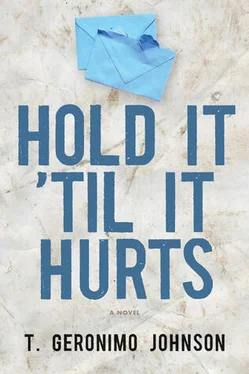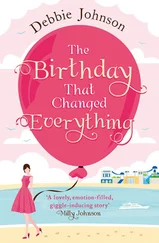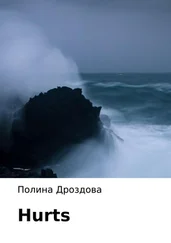“You’re probably right,” she said. “Were you really in Goddamnistan?”
“Who would make that up?” asked Achilles.
“A lot of people.” She nodded knowingly.
“Not if they were there,” said Achilles.
“That’s a tautology,” she said.
The teens snickered. Achilles shrugged it off. He didn’t know what it meant. Did she say Goddamnistan a minute ago? She couldn’t have.
“You’re serious,” said Ines, facing him squarely. “Okay. Let me guess. You were in a hipster bar, someone insulted your commander-in-chief, and you decked the guy.”
Achilles shook his head.
“Girlfriend dragged you out tonight?”
“No.”
“On your own. That’s unusual. Since you’re trying to do the right thing, could you monitor the line? We’re shorthanded. Just remind them not to push or fight. If they do, yell. There’s always one off-duty cop, but he’s inside because it’s air-conditioned. What can I say? It’s volunteer work.”
“Sure.”
Ines pulled a pen out of her hair and wrote something on her forearm. “We’ll owe you one. Thanks.”
At first, Achilles didn’t see any problem with agreeing to help. He’d planned on watching the line anyway. The St. Jude line was no different from the St. Augustine line. They stomped and stammered loudly at the end of the line, but shuffled and whispered as they approached the door, avoiding eye contact. Within ten minutes of pacing, his eyes drawn to the intersections whenever anyone approached, he regretted his decision. His shirt was plastered to his back, the bandages on his arm damp, and his boxers bunched up in a damp wad. As the men filed inside, they straightened up and focused on Ines like BBs to a magnet, and she looked them in the eye and called them brother, all of them, black, white, brown, and the two yellows.
In Kabul, he’d known white people like her in the charities. Nicknamed NGOs because No Government Organization gave shit away, they were staffed by glassy-eyed Americans. “Brother! Brother!” an Afghan would shout, but they knew it was solidarity by circumstance. The white Americans were different, saying “brother” like they believed it, earnestly claiming kinship with all humanity. Most volunteers were idealists or opportunists running a side scam. Both camps scorned the soldiers, though the opportunists admitted that they profited from destruction because no matter how much food, medicine, and clothing they gave away someone else paid for it, and paid them to deliver it. Charity was big business. The desk pilots understood that, as did the smugglers — who were more fun to drink with — but most volunteers were naïve optimists, though they didn’t think of themselves as naïve; how else could they be optimistic?
After a week in country, the volunteers would tell a sad tale about the day they realized Afghan kids imitated gunfire and artillery while playing with their toy trucks and planes. Isn’t that why we’re here? Wasn’t that what most trucks and planes were doing in Goddamnistan? Achilles would ask. But he’d never push it. If he did, they’d start moaning about the army’s deplorable recruiting tactics, their tendency to target neighborhoods like the one Achilles must have grown up in. They’d sigh for him, curse the government, saying what they assumed he couldn’t, steadfast in their belief that Achilles was a victim, a sacrificial lamb on the altar of Democracy, not understanding that he hadn’t volunteered to die for anything. He’d been indirectly drafted. But he let them talk. Liberal guilt was always good for a few beers.
After the shelter closed, Ines stopped to talk to him on the way to her car. They stood in the street while the off-duty cop extinguished the lights one by one until the building was dark. Achilles had thought people stayed there overnight, that maybe there was yet a chance that Troy might arrive. But of course he hadn’t seen Troy. He hadn’t really expected to. Ines was what he needed, a distraction from all the possibilities he couldn’t admit to himself that he was even considering.
She thanked him for helping out, adding, “The students thought you were here for community service. It’s rare we get a real live hero here.”
Hero. Achilles smiled weakly.
“Volunteer often?” asked Ines.
“I just finished two paid vacations,” said Achilles.
“That’s right. Twenty months of shawarma,” she said.
“And bitter beer,” he said.
She made a lemon-sucking face. “Yuck! You were there.” In a serious tone, she added, “When did you get back?”
“About a month ago.”
She nodded knowingly. “Ah-ha! That explains the scars. What did you do?”
“Airborne Infantry.”
“An airborne soldier saved my life outside of Jalabad. He carried me right out of a minefield. I wandered into it and froze. We were bringing medical supplies to a remote village, and I had to go to the bathroom. It was my first week in country and I wanted privacy, the ubiquitous American amenity. There I was squatting down and I look over and see the sign. He walked right in after me and carried me out. You believe that? Of course you do.”
He had heard her say Goddamnistan. “Sounds like a murder-suicide pact.”
Ines frowned. “He had a metal detector.”
Her savior wasn’t as crazy as Troy, but she’d think Troy brave. “There are units specially equipped for that.”
“He had a metal detector,” repeated Ines.
He smelled something burning and looked in the direction of the green camelback. She turned to follow his gaze. He stole a glance at her profile, the outline of her white tee pressing against the night.
“Are you here often?” asked Achilles.
“Tomorrow I’ll be at the new St. Jude.”
The next two nights, he went to the new St. Jude, a converted high school significantly larger than the old location. An immense brick building with a white stone foundation, its four turrets and tiny windows gave the shelter the appearance of a fortified structure. The classrooms were dormitories and the cafeteria had annexed the gymnasium. Troy wasn’t there, but Ines was, because her work involved several shelters, and Achilles took the opportunity to learn about the other organizations, each night dutifully plotting them on his map.
As she explained it, “I coordinate the efforts between different shelters, churches, and NGOs, if they’re willing to cooperate and their charters allow it. If their calendars and interests intersect, I team them up for lower pricing and better services. For example, if St. Jude wants to feed a neighborhood on the same day that St. Mark’s plans a health clinic, I get them to overlap.”
“So you know all the churches and shelters?” asked Achilles.
“Every single one.”
“And you came up with this on your own?”
“Sure did.”
“That’s admirable,” said Achilles.
“Why do you say that?” she asked, cocking her head to the side.
“It just is.”
“So you’re the measure of what’s admirable?”
“I do know what I admire.”
“We’ll see if you’re still around in two weeks, when your guilt wears off.”
“I’m not guilty of anything,” said Achilles, crossing his arms.
“Of course not.”
“You?”
“Never. It’s what we do. My friends, family, all of us. I attended a small school in the Northeast. You know how it is. You’re young with a heart as big as the Hindenburg, and just as volatile. We joined the Peace Corps, went to grad school, to teach, or to New York. Every single person. Volunteering is best, a paid internship in an exotic locale. You help out without feeling any discomfort except the recognition of just how wealthy this country is. Then one day I asked myself why I was a thousand miles away when these black kids right here needed my help. I was just like all those white girls who do mindless shit to assuage guilt they claim not to have. You know how most white people are.”
Читать дальше












